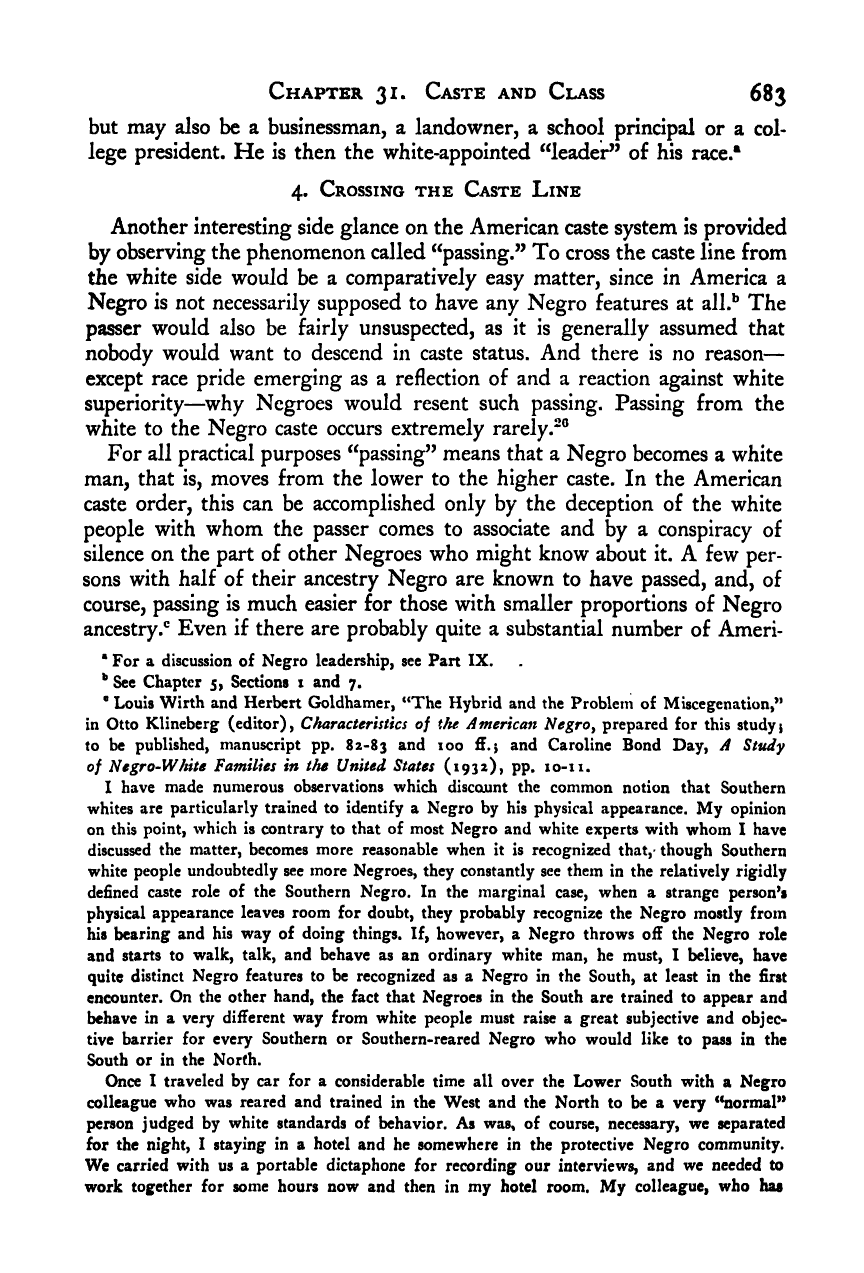Note: Gunnar Myrdal died in 1987, less than 70 years ago. Therefore, this work is protected by copyright, restricting your legal rights to reproduce it. However, you are welcome to view it on screen, as you do now. Read more about copyright.
Full resolution (TIFF) - On this page / på denna sida - VIII. Social Stratification - 31. Caste and Class - 3. The Caste Struggle - 4. Crossing the Caste Line

<< prev. page << föreg. sida << >> nästa sida >> next page >>
Below is the raw OCR text
from the above scanned image.
Do you see an error? Proofread the page now!
Här nedan syns maskintolkade texten från faksimilbilden ovan.
Ser du något fel? Korrekturläs sidan nu!
This page has never been proofread. / Denna sida har aldrig korrekturlästs.
Chapter 31. Caste and Class 683
but may also be a businessman, a landowner, a school principal or a col-
lege president. He is then the white-appointed ^4eader” of his race.®
4. Crossing the Caste Line
Another interesting side glance on the American caste system is provided
by observing the phenomenon called "passing.” To cross the caste line from
the white side would be a comparatively easy matter, since in America a
Negro is not necessarily supposed to have any Negro features at all.** The
passer would also be fairly unsuspected, as it is generally assumed that
nobody would want to descend in caste status. And there is no reason
—
except race pride emerging as a reflection of and a reaction against white
superiority—why Negroes would resent such passing. Passing from the
white to the Negro caste occurs extremely rarely.^’®
For all practical purposes "passing” means that a Negro becomes a white
man, that is, moves from the lower to the higher caste. In the American
caste order, this can be accomplished only by the deception of the white
people with whom the passer comes to associate and by a conspiracy of
silence on the part of other Negroes who might know about it. A few per-
sons with half of their ancestry Negro are known to have passed, and, of
course, passing is much easier for those with smaller proportions of Negro
ancestry Even if there are probably quite a substantial number of Ameri-
* For a discussion of Negro leadership, see Part IX.
**
See Chapter 5, Sections i and 7.
• Louis Wirth and Herbert Goldhamer, “The Hybrid and the Problem of Miscegenation,”
in Otto Klineberg (editor), Cfiaracteristics of the American Negro, prepared for this study
j
to be published, manuscript pp. 82-83 and 100 £F.j and Caroline Bond Day, A Study
of Negro-White Families in the United States (1932), pp. lo-ii.
I have made numerous observations which discooint the common notion that Southern
whites are particularly trained to identify a Negro by his physical appearance. My opinion
on this point, which is contrary to that of most Negro and white experts with whom I have
discussed the matter, becomes more reasonable when it is recognized that,- though Southern
white people undoubtedly see more Negroes, they constantly see them in the relatively rigidly
defined caste role of the Southern Negro. In the marginal case, when a strange person’s
physical appearance leaves room for doubt, they probably recognize the Negro mostly from
his bearing and his way of doing things. If, however, a Negro throws off the Negro role
and starts to walk, talk, and behave as an ordinary white man, he must, I believe, have
quite distinct Negro features to be recognized as a Negro in the South, at least in the first
encounter. On the other hand, the fact that Negroes in the South are trained to appear and
behave in a very different way from white people must raise a great subjective and objec-
tive barrier for every Southern or Southern-reared Negro who would like to pass in the
South or in the North.
Once I traveled by car for a considerable time all over the Lower South with a Negro
colleague who was reared and trained in the West and the North to be a very “normal”
person judged by white standards of behavior. As was, of course, necessary, we separated
for the night, I staying in a hotel and he somewhere in the protective Negro community.
We carried with us a portable dictaphone for recording our interviews, and we needed to
work together for some hours now and then in my hotel room. My colleague, who has
<< prev. page << föreg. sida << >> nästa sida >> next page >>